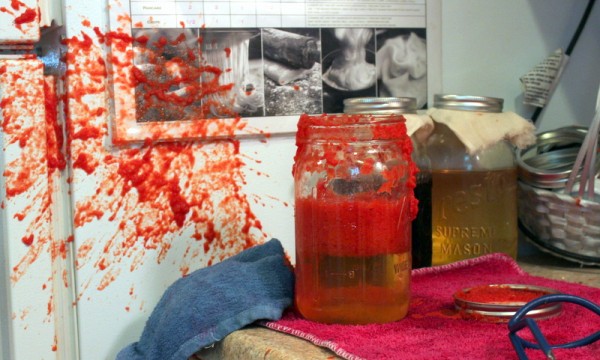In one week, ghouls, witches, and zombies will roam the streets. Are you ready? Do you have food for several days and a way too cook? Are you able to collect and/or sanitize water? What will you do if one of those zombies injures you or someone you love?
I can hear you saying that the zombies aren't real. They're just kids dressed up for Halloween. The only preparation needed is a stockpile of candy.
You are right. We don't believe zombies are real either. But we do talk about "when zombies attack." It's our joke code scenario for disaster preparations.
Disasters - wind storms, blizzards, flooding, black outs - are scary and unlike a zombie outbreak, they're real. In our twelve years of being homeowners, we've encountered a hurricane (when we lived in Virginia), two blizzards, and a derecho that wiped out power and access to resources.
Those who are ready for anything are also usually hoarding years' worth of processed food and water that will rarely be consumed - we don't fall in that camp. Rather, we aim for general preparations that will help us survive a big storm but can still be used in our daily lives. Many of our preparations come from our regular habits of cooking from scratch, canning year-round and enjoying camping and backpacking.
Minimalist Preparations
So what does one need to be prepared for when zombies attack, or when there's a long-term power outage or weather problem? We focus on the basic needs first:
Shelter - Our home is a two story concrete block monolith that even the home inspector said "could probably withstand a tornado on the second floor". Beyond that, we have two small, weather tight, tents and sub-zero sleeping bags for everyone which could allow us to sleep outside if necessary.
Food - We grow some of our own food and save seeds to replant without resupply. We practice foraging and keep chickens which could provide several meals if needed. We can fruits and vegetables, keep roots and fruit in the cellar, have at least ten pounds of bulk grain on hand at any given time, and practice charcuterie. Alex hunts. We might not eat perfectly balanced meals, but I'm certain we could feed ourselves for at least a week with what's in the house and we have the skills to create food from what's around us for many more meals.
Water - We keep three different ways to sanitize water: a backpacking pump water filter
Heat - Our woodstove and wood piles are a potential source of warmth and cooking if gas or electric service are interrupted. In addition we have several varieties of backpacking stoves, grills, and a propane burner with a reasonable supply of their various fuels.
Clothing - We invest in waterproof breathable rain jackets, wool socks, and walking shoes so that each member of the family can be outside for extended periods of time in all types of weather if necessary.
When Zombies Attack
We aim to be self-sufficient for more complicated disasters too. Here's how:
Medicine - We keep a well-stocked first aid kit including burn, splint, cut, pain, and infection supplies. The first aid kit includes matches and alcohol wipes for sanitation. Alex and I have both taken CPR and First Aid courses. We practice using herbal remedies, including foraged ones, when appropriate.
Communication - Alex went through a ham radio kick a few years ago. Though I still think ham radio is a relic of a bygone era, we do keep the radios if cell communications.
Back-up Systems - After the wind storm of 2012, we vowed to not suffer through another summer power outage without fans and a way to run the chest freezer of meat. We invested in a propane generator that can power essential electric appliances. A more ideal system would involve battery backups and/or solar power but we need to save more before we invest in those.
Flight - We don't know how to fly, but we are prepared with cash and current passports to leave the country if we ever should need to. This isn't just a good practice in the case of disaster but allows us the chance to travel at will for pleasure.
Your Best Defense Against Zombies
The very best defense against zombies, which is also what they would be after if they were real, is BRAINS. All the 'stuff' in the world will not save you if you don't know how to use it. We use the tools we have on hand for disasters in everyday homesteading tasks. We cook by intuition. We start fires, butcher animals, and know where to find wild food.
You can train your brains too. Start by camping outside a few nights without electricity or challenge yourself to make meals with just what you have on hand. Map out potential resources and how you will access them in the case of a power outage or blocked roadways. Practice a new skill or learn a new wild edible each month.
How do you prepare? I don't want to lose any of you to zombies!



